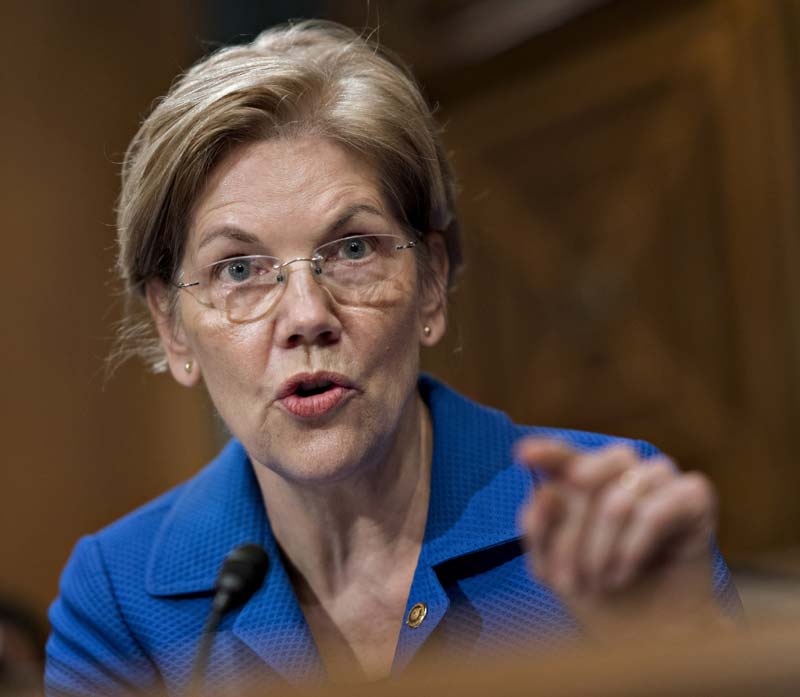 Andrew Harrer for Bloomberg
Andrew Harrer for Bloomberg
WASHINGTON - Sen. Elizabeth Warren, D-Mass., announced Monday that she will not participate in a high-dollar fundraising program during her bid for the Democratic presidential nomination, staking out a position that differentiates her from most other contenders in the field.
"Candidates spend too much time with wealthy donors, and I've made a decision to change that," Warren wrote as the subject line in an email that went out to her supporters Monday morning explaining the decision.
"That means no fancy receptions or big money fundraisers only with people who can write the big checks," Warren wrote. "It means that wealthy donors won't be able to purchase better seats or one-on-one time with me at our events."
Eschewing traditional fundraising during the primary race will provide Warren with a potentially potent talking point on the stump, bolster her self-definition as a fighter for the working class and free up a significant amount of time in early states to organize and meet voters.
But it comes at a risk: Warren has acknowledged in her fundraising emails that she hasn't achieved her online targets, a problem confirmed by a person familiar with her campaign's finances. Closing the door to high-dollar events will put even more pressure on her to come up with smaller contributions.
An aide to Warren's campaign said the decision will cost the senator "millions" of dollars she could otherwise have raised.
The move will also provide Warren's camp with a ready-made excuse if her first-quarter fundraising totals are lower than expected. Those figures are released in mid-April and are traditionally seen as an early gauge of a candidate's strength.
In her 2018 Senate race, Warren did not rely heavily on big donors, defined as those who gave the maximum allowed per election of $2,700. About 220 donors wrote Warren at least one check for $2,700, according to an analysis by The Washington Post. About 80 donors, including actor Ben Affleck, who was raised in Massachusetts, wrote her two checks for this amount, providing the maximum for the primary and the general elections.
The federal limits have been raised slightly for the 2020 election cycle, and candidates can raise $2,800 per person for their primary campaigns.
According to the rules she set out Monday, Warren will still accept checks of this size, but she will not hold the private dinners and events typically associated with big contributions. Her top staffers will still call big donors, but they will be barred from offering access to the senator as part of the pitch, according to a Warren aide.
Warren will try to make up for the lack of traditional fundraisers by adjusting her stump speech to make a direct request for supporters to donate via her website, according to an aide.
The senator has not held any private fundraisers since she announced her presidential campaign, according to Warren aides. But she did hold high-dollar events during her 2018 Senate reelection effort, and the money raised was part of the $11 million she transferred to her presidential campaign.
And she has appeared at money events for other groups. Last Friday, she was the main speaker at a fundraising dinner for the New Hampshire Democratic Party. The state party said it raised about $400,000.
Warren already had said that she would not accept money from lobbyists and political action committees, and would not sanction a super PAC to operate on her behalf.
The only other top contender in a position to entirely fund a campaign via smaller donations is Sen. Bernie Sanders, I-Vt. He reported raising $6 million in the 24 hours after announcing his presidential bid - an average of $27 per donor.
Sanders held several high-dollar fundraisers during his 2016 presidential campaign.
Warren's decision sets her apart from other Democratic candidates, including Sens. Cory Booker of New Jersey, Kirsten Gillibrand of New York and Kamala Harris of California. Harris initially defended taking donations from corporate PACs and corporate lobbyists, but later reversed herself to say she wouldn't accept such money.
Neither Harris's nor Sanders's campaign responded to a request for comment on Warren's move.
Harris has held high-dollar fundraisers since entering the race, including an event in Warren's home territory of Boston, first reported by the Boston Globe. It drew several past Warren donors.
Every weekday JewishWorldReview.com publishes what many in the media and Washington consider "must-reading". Sign up for the daily JWR update. It's free. Just click here.
(COMMENT, BELOW)


 Contact The Editor
Contact The Editor
 Articles By This Author
Articles By This Author